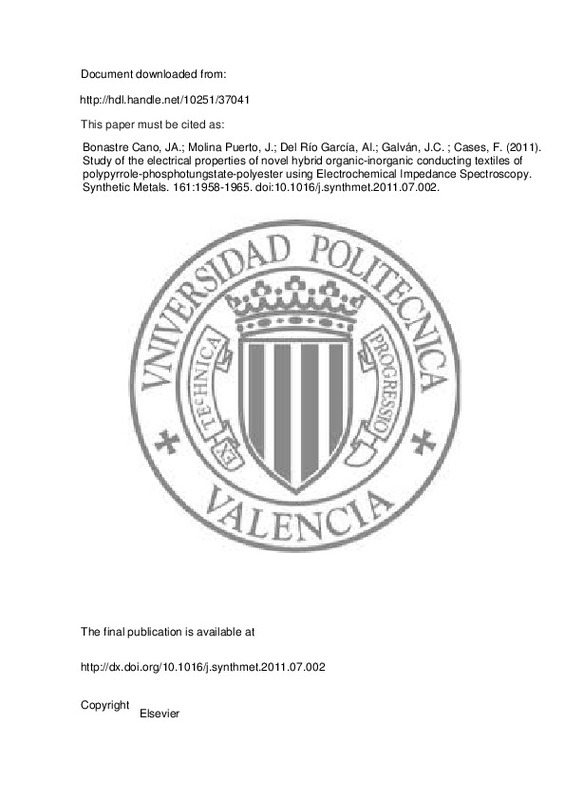Bonastre Cano, JA.; Molina Puerto, J.; Del Río García, AI.; Galván, JC.; Cases Iborra, FJ. (2011). Study of the electrical properties of novel hybrid organic-inorganic conducting textiles of polypyrrole-phosphotungstate-polyester using electrochemical impedance spectroscopy. Synthetic Metals. 161(17-18):1958-1965. https://doi.org/10.1016/j.synthmet.2011.07.002
Por favor, use este identificador para citar o enlazar este ítem: http://hdl.handle.net/10251/37041
|
Título:
|
Study of the electrical properties of novel hybrid organic-inorganic conducting textiles of polypyrrole-phosphotungstate-polyester using electrochemical impedance spectroscopy
|
|
Autor:
|

 Bonastre Cano, José Antonio
Bonastre Cano, José Antonio

 Molina Puerto, Javier
Del Río García, Ana Isabel
Galván, J. C.
Molina Puerto, Javier
Del Río García, Ana Isabel
Galván, J. C.

 Cases Iborra, Francisco Javier
Cases Iborra, Francisco Javier
|
|
Entidad UPV:
|
Universitat Politècnica de València. Departamento de Ingeniería Textil y Papelera - Departament d'Enginyeria Tèxtil i Paperera
|
|
Fecha difusión:
|
|
|
Resumen:
|
The electrical properties of novel hybrid organic-inorganic conducting fabrics of polyester (PES) coated with polypyrrole-PW12O 403- (PPy-POM) have been tested for dry samples and specimens immersed in different pH solutions ...[+]
The electrical properties of novel hybrid organic-inorganic conducting fabrics of polyester (PES) coated with polypyrrole-PW12O 403- (PPy-POM) have been tested for dry samples and specimens immersed in different pH solutions (1, 7, and 13). Electrical properties changes were measured by means of electrochemical impedance spectroscopy (EIS). This study showed that organic-inorganic PES-PPy-POM conducting textiles act as electronic conductors with semiconducting nature. The electrical conductivity was measured for different temperatures and a value of 44.4 meV was obtained for the activation energy by means of Arrhenius model. Samples immersed in solution increased their conductivity in more acid solutions due to polypyrrole protonation. As acidity increased protonation and oxidation state of polypyrrole chains increased, and a greater diffusion of counter-ions was observed since the hybrid conducting textiles presented a more swollen and porous structure. Counter-ion exchange was higher in more acid solutions since more charge was needed to compensate the positive charge of more oxidized polypyrrole chains. A catalytic effect might be expected for the H+ reduction for this new organic-inorganic electrode material in acid media. © 2011 Elsevier B.V. All rights reserved.
[-]
|
|
Palabras clave:
|
Conducting fabrics
,
EIS
,
Organic-inorganic
,
Phosphotungstate
,
Polypyrrole
,
Acid media
,
Acid solutions
,
Arrhenius models
,
Catalytic effects
,
Conducting textiles
,
Counterions
,
Electrical conductivity
,
Electrode material
,
Electronic conductors
,
Hybrid conducting
,
Oxidation state
,
Polypyrrole chains
,
Porous structures
,
Positive charges
,
Activation energy
,
Electric conductivity
,
Electrochemical corrosion
,
Electrochemical properties
,
Esters
,
Fabrics
,
Ion exchange
,
Polypyrroles
,
Protonation
,
Electrochemical impedance spectroscopy
|
|
Derechos de uso:
|
Reserva de todos los derechos
|
|
Fuente:
|
Synthetic Metals. (issn:
0379-6779
)
|
|
DOI:
|
10.1016/j.synthmet.2011.07.002
|
|
Editorial:
|
Elsevier
|
|
Versión del editor:
|
http://dx.doi.org/10.1016/j.synthmet.2011.07.002
|
|
Código del Proyecto:
|
info:eu-repo/grantAgreement/MICINN//CTM2010-18842-C02-02/ES/TRATAMIENTO ELECTROQUIMICO DE DISOLUCIONES DE COLORANTES REACTIVOS EMPLEADOS EN LA INDUSTRIA TEXTIL Y DESARROLLO DE NUEVOS MATERIALES ELECTRODICOS./
info:eu-repo/grantAgreement/UPV//PAID-06-10/
|
|
Agradecimientos:
|
Authors thank to the Spanish Ministerio de Ciencia y Tecnologia and European Union Funds (FEDER) (CTM2010-18842-C02-02) and Universitat Politecnica de Valencia (Programa de Apoyo a la Investigacion y Desarrollo de la UPV ...[+]
Authors thank to the Spanish Ministerio de Ciencia y Tecnologia and European Union Funds (FEDER) (CTM2010-18842-C02-02) and Universitat Politecnica de Valencia (Programa de Apoyo a la Investigacion y Desarrollo de la UPV (PAID-06-10)) for the financial support. J. Molina is grateful to the Conselleria d'Educacio (Generalitat Valenciana) for the FPI fellowship. A.I. del Rio is grateful to the Spanish Ministerio de Ciencia y Tecnologia for the FPI fellowship.
[-]
|
|
Tipo:
|
Artículo
|







![[Cerrado]](/themes/UPV/images/candado.png)


